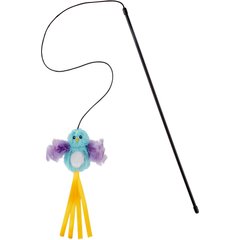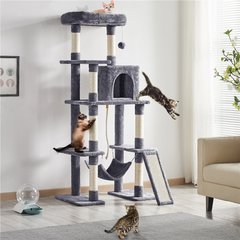Is Your Cat Bored? Tips to Fight Feline Boredom

Photo by ramustagram / iStock / Getty Images Plus
A long stretch, a dramatic yawn, and half-closed eyes—your cat may spend much of the day looking bored, but beware: sometimes these behaviors have a deeper meaning.
What looks like boredom in cats are often signs of stress or frustration caused by a lack of stimulation, according to veterinary behaviorists.
Signs of Boredom in Cats
Your cat has many ways of telling you they need more stimulation. Some of the clearest signals are repetitive behaviors, including frequent meowing, pacing, or excessive grooming that may lead to bald patches.
Other cats chase their tails or seem unable to settle down, while some channel their frustration into destructive acts, like shredding furniture or knocking household items off shelves.
“What people think of as ‘boredom’ is actually frustration and stress due to a lack of environmental enrichment,” says Blake Gibson, DVM, a behavioral medicine resident at Texas Veterinary Behavior Services and VCA Lexington Boulevard Animal Hospital, both in Sugar Land, Texas.
Fortunately, there are ways you can help, by providing distractions like wands, plush toys, and things to chase and interact with.
Recommended Products
Distractions are especially important because bored cats can also be destructive cars. Behaviors such as ambushing ankles, clawing, mouthing, or even biting are all ways a cat may try to create excitement. Stress sometimes also shows up in the litter box—stressed cats more more likely to soil the house or develop urinary problems.
Finally, bored cats might just look extra sleepy. Cats already nap a lot, but if yours sleeps excessively and shows little interest in play or exploration, it may be due to “limited opportunities for play or exploring,” says Ellen M. Lindell, VMD, DACVB, a board-certified veterinary behaviorist at Veterinary Behavior Consultations in Asheville, North Carolina.
In some cases, bored cats turn to food for stimulation and over-eat, which can lead to obesity, arthritis, and diabetes.
Recommended Products
Causes of Boredom in Cats
Cats are wired to hunt, stalk, and explore. If your cat is stuck inside and alone all day, it can cause boredom.
Breed and personality matter too. Active breeds like Bengals, Savannahs, and Ocicats typically need more outlets than more laid-back cats. And while some cats are perfectly content with solitude, others crave companionship and quality time with their favorite human.
Recommended Products
Helping Your Bored Cat
The key to helping your cat fight boredom is to keep them active and engaged. Even two or three 10-minute sessions of interactive play every day can improve a cat’s mood and health. In addition to a wide selection of toys, you can also make your house more fun and engaging. Consider putting in tall cat trees, shelves, or window perches. These will encourage climbing and provide safe spots for observing.
Recommended Products
If you notice your cat starts to abandon once-favorite toys, consider swapping them out with something new and challenging—and remember that every cat is different. Some love cozy resting spots, while others crave action. Bird-watching windows are a favorite for most cats, and some adventurous cats enjoy going outside (after they are leash-trained) or spending time on a catio for safe outdoor time.
“Try saving your Chewy boxes and set one out periodically for the cat to investigate,” says Dr. Gibson. “These boxes pass through a lot of places and hands during shipping, which means each one is unique in odor.”
Or try sprinkling safe herbs like dried basil or cinnamon around the house for an added layer of stimulation (without letting your cat eat them).
Recommended Products
When to See a Vet
Not every behavior problem is about boredom. Any sudden change—less play, more hiding, unusual vocalization, or increased sleep—should be checked by a veterinarian. Cats are masters at masking illness, and issues like urinary disease or arthritis can look a lot like disinterest or fatigue.
FAQs About Bored Cats
Q: Do indoor cats get bored?
A: Yes, but enrichment can make indoor life stimulating and safe.
Q: Are cats fine doing nothing all day?
A: No—while they sleep up to 16 hours, they need activity during waking hours.
Should I let my indoor cat outside?
A: Not unsupervised. Outdoor risks are high; harness walks or catios are safer.
Q: Is my cat hungry or bored?
A: If begging follows a meal, they’re likely seeking play, not food.
Q: Are solo cats bored?
A: Some enjoy feline company, but many thrive alone with proper enrichment and attention.














